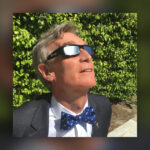Europa Clipper’s message in a bottle
NASA’s Europa Clipper mission is almost ready for its historic trip to the Jovian system. Merc Boyan, a visual storyteller at The Planetary Society, takes us into the clean room at NASA’s Jet Propulsion Laboratory to speak with team members about the spacecraft. Then Bob Pappalardo, project scientist for Europa Clipper, visits The Planetary Society headquarters in Pasadena, CA, to share the story of the mission’s vault plate, humanity’s next collection of messages to another world. Bruce Betts, the...











